Leap day: ‘I’m 28, but I’ve only had seven birthdays’
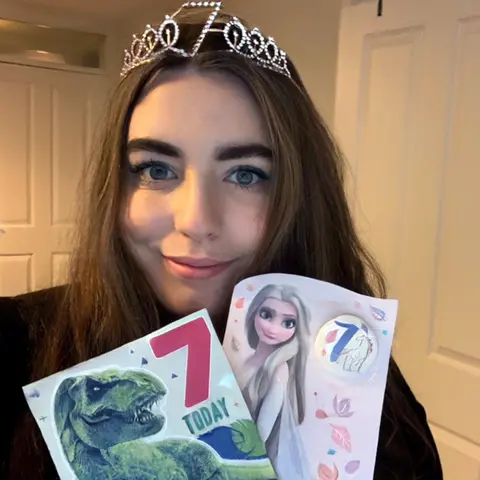 Julia Alsop
Julia AlsopWhat is it like to only be able to celebrate your birthday once every four years? Far from missing out, many so-called leaplings say there is something special about being one of the rare people born on 29 February.
Julia Alsop will blow out seven candles on her birthday cake this year - she is going to be 28.
When she tells people she will be celebrating her seventh birthday in 2024, she says they look at her as if to say: "'What on Earth are you talking about?'" And then it clicks.
Julia, a medical student from Warwickshire, is a leapling. She was born on 29 February, an elusive day that appears once every four years in a leap year - so she's only had seven birthdays on her actual day in her lifetime.
 Julia Alsop
Julia AlsopLeaplings are rare. There is about a one in 1,461 chance of being born on 29 February.
Julia loves that her birthday is different, and this year is looking forward to opening her seventh birthday cards on her actual big day. In a non-leap year, when she has no official day to celebrate on, she instead plans a week of festivities.
There can be some technical difficulties involved in being a leapling, says Julia. When taking out a new phone contract, she failed the credit check because 29 February didn't appear as a date on the system.
She says that was "really frustrating". "They made it seem like my birthday didn't exist."
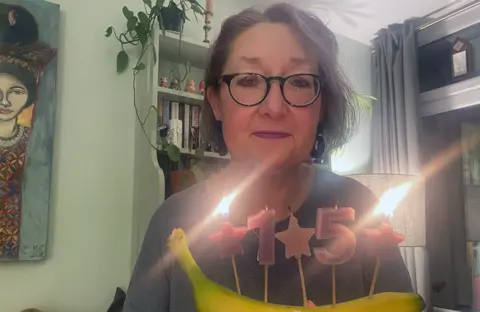 Jane Atkin
Jane AtkinSometimes the dropdown boxes on online forms will only list 28 days for February, says Jane Atkin, a primary school teacher from London.
She is turning 15 (or 60) this year.
"Quite often I have to put in 28 February, which rankles, because that's not my date of birth," she says of the problematic dropdown forms.
But being a leapling does feel special because it is so unusual, says Jane. A few years ago, when it was her eighth and ninth leap year birthdays, the 10 and 11 years olds in her class thought it highly amusing that they were older than their teacher, she recalls.
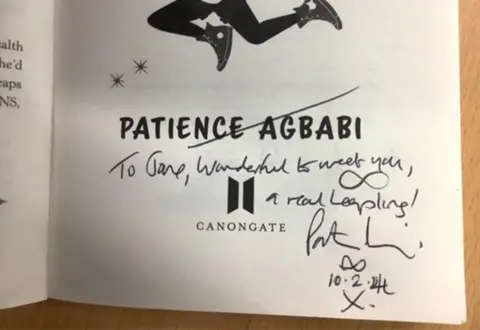 Jane Atkin
Jane AtkinAuthor, Patience Agbabi, has written a series of children's fictional books about a young leapling who possesses the special gift of being able to leap through time. Jane says she contacted Patience on social media ahead of attending a book reading and signing with the author.
"She replied to me," says Jane, "and said, 'I'm so excited that you're coming. Normally when I do a talk about my books, I ask if there are any leaplings, and there never are'."
When she was younger, Jane's mother chose to mark her daughter's non-leap year birthdays on 28 February. But as she got older, Jane began to also celebrate on 1 March - because "why not?" she adds.
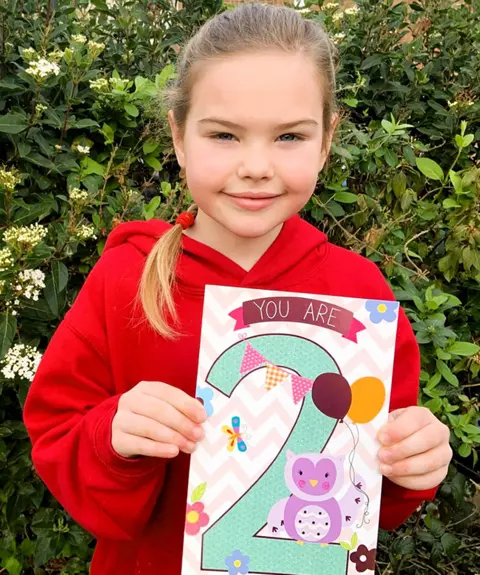 Jo and Abi
Jo and AbiAbi, from Surrey, is two (or eight) this year. She made the decision last year to celebrate her birthday on 1 March, as she realised 28 February didn't make sense - she wouldn't have been born yet.
Abi's mother, Jo, recalls a conversation she had with a midwife at the hospital when her daughter was born.
"I said, 'Oh, it's very quiet in here', and one of the midwives said, 'Nobody wants a leap baby'."
Not always being able to celebrate on her actual birth date has been difficult for Abi to understand, says Jo. But she definitely wouldn't change her daughter's date of birth now.
"She's very special and I think it really suits her," says Jo. "I always say to her, you'll change the world Ab. She's a unique kid."
 Jo and Abi
Jo and AbiAbi is planning to celebrate this year in style.
"I will have a sweetie cake for my birthday party at the family, and then, with all my friends, I will have another sweetie cake," she says.

What is a leap year and why do we have them?
- It takes the Earth 365 days, five hours, 48 minutes and 46 seconds to orbit the sun. This extra five hours, 48 minutes and 46 seconds needs to be taken into account, otherwise the seasons would gradually shift and summer could eventually end up starting in January
- Leap years occur in the calendar every four years to help make this adjustment, but the maths still doesn't quite work out, so every 100 years, we skip a leap year, unless the year is divisible by 400. The next leap year to be skipped will be 2100
- The phrase "leap year" is used because every date on the calendar jumps forward in the 12 months following a leap day. So if your birthday was on a Monday last year, it would leap over the next day and be on Wednesday this year.

Joe Middleton, from Leicestershire, is turning eight (or 32) this year. He says he is extra lucky around his leap year birthdays, winning competitions in the past.
He now works in property, but trained as an actor, and says his colleagues often joke that he is the youngest member of the team - even though he's not.
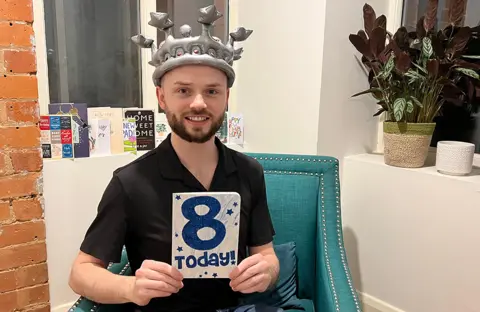 Joe Middleton
Joe MiddletonAs a student, Joe's unusual birth date would often confuse the bouncers at a nightclub when they asked to see his ID. With his youthful face, his birthday meant he had a lot more explaining to do before they would let him in.
On a non-leap year, he usually celebrates on 28 February, but often keeps the festivities going into 1 March as well.
"Facebook, for example, gets confused and tells people that my birthday's on both days," says Joe. "It doesn't really know where to place me. So then I get messages from friends and relatives on both days because people don't really know which day I'm celebrating on."
Rather than missing out on birthdays, he wants more people to know leaplings get double the opportunity to celebrate - and that being in this special club is "a gift".
